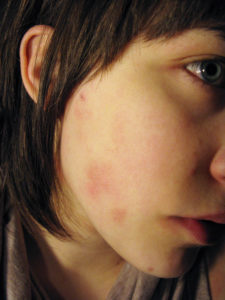 About a year ago, I went to my first visit with a naturopathic doctor. I had many digestive complaints and general malaise. The ND suggested food sensitivity testing. I had tried many different elimination diets through trial and error, but I never could determine what caused my issues.
About a year ago, I went to my first visit with a naturopathic doctor. I had many digestive complaints and general malaise. The ND suggested food sensitivity testing. I had tried many different elimination diets through trial and error, but I never could determine what caused my issues.
The results of the blood food sensitivity test came back with about a dozen items. It wasn’t a huge list. Pineapple, baking yeast, cow milk, goat milk, green beans, rye, black pepper, etc. It seemed so random and strange.
I began a three-month diet avoiding all the foods on my list. Surprisingly, an unexpected benefit was the clearing of my eczema and seborrheic dermatitis!
Previously, I had seen a dermatologist and medical doctor about these issues. I didn’t even think of mentioning it to the naturopath. The dermatologist wrote a prescription for a special shampoo and steroid cream. I crumpled up the prescription and never filled it.
I tried many natural remedies to relieve the itchy, flaky, rough skin symptoms. From tea tree oil to lavender oil, essential oils offered some relief, but the problems persisted. I had one patch of eczema on my neck that never went away. I had seborrheic dermatitis right above my forehead. Huge flakes of scalp would come off. It would burn and itch terribly. Sometimes it even bled.
After about a month of removing my food sensitivities from my diet, I found my eczema and seborrheic dermatitis were gone. I mentioned it to my naturopath, and she said skin issues usually are caused by food issues.
I had no idea. I wondered why the dermatologist and MD wanted to prescribe medications rather than find the cause of my skin conditions. It was so simple.
There are many resources online and books on eczema diets. Without actual testing, you are playing a guessing game as to what specifically are your triggers. It takes time for the body to react, and you might not have a full blown allergy but just a sensitivity as a trigger. Children are more susceptible than adults, although my conditions developed in my twenties.
The peer-reviewed article “Diet and Dermatitis: Food Triggers” published in the Journal of Clinical and Aesthetic Dermatology explains:
Foods may trigger rapid, immunoglobulin E-mediated hypersensitivity reactions or may lead to late eczematous reactions. While immediate reactions occur within minutes to hours of food exposure, late eczematous reactions may occur anywhere from hours to two days later. Screening methods, such as food allergen-specific serum immunoglobulin E tests or skin prick tests, can identify sensitization to specific foods, but a diagnosis of food allergy requires specific signs and symptoms that occur reproducibly upon food exposure. Many patients who are sensitized will not develop clinical findings upon food exposure; therefore, these tests may result in false-positive tests for food allergy.[note]https://www.ncbi.nlm.nih.gov/pmc/articles/PMC3970830/[/note]
After three months of abstaining, I reintroduced the foods on my sensitivity list into my diet. My skin conditions returned, although not as intensely. I now know how to control them.
If you suffer from any skin conditions, try testing for food sensitivities. I am thankful I did. You can try different recommended diets for skin issues, but testing takes out the guessing game.
Photo: katharine shields on Flikr Some rights reserved
I have psoriasis on my feet and hands. Dermalmd Psoriasis Serum is great and really soothes when applied. It hasn’t gotten rid of it as my case is fairly advanced but it does soften the plaques